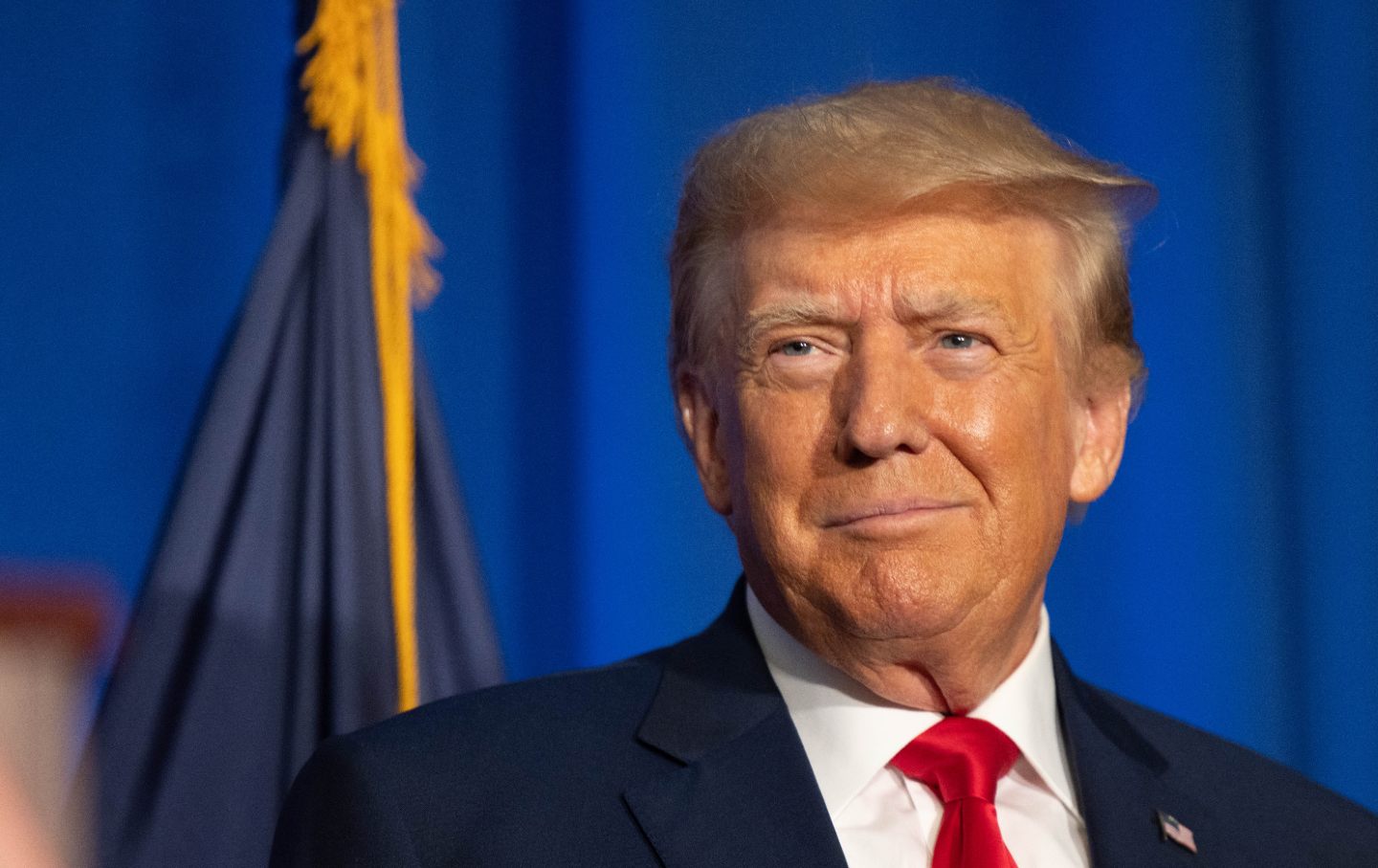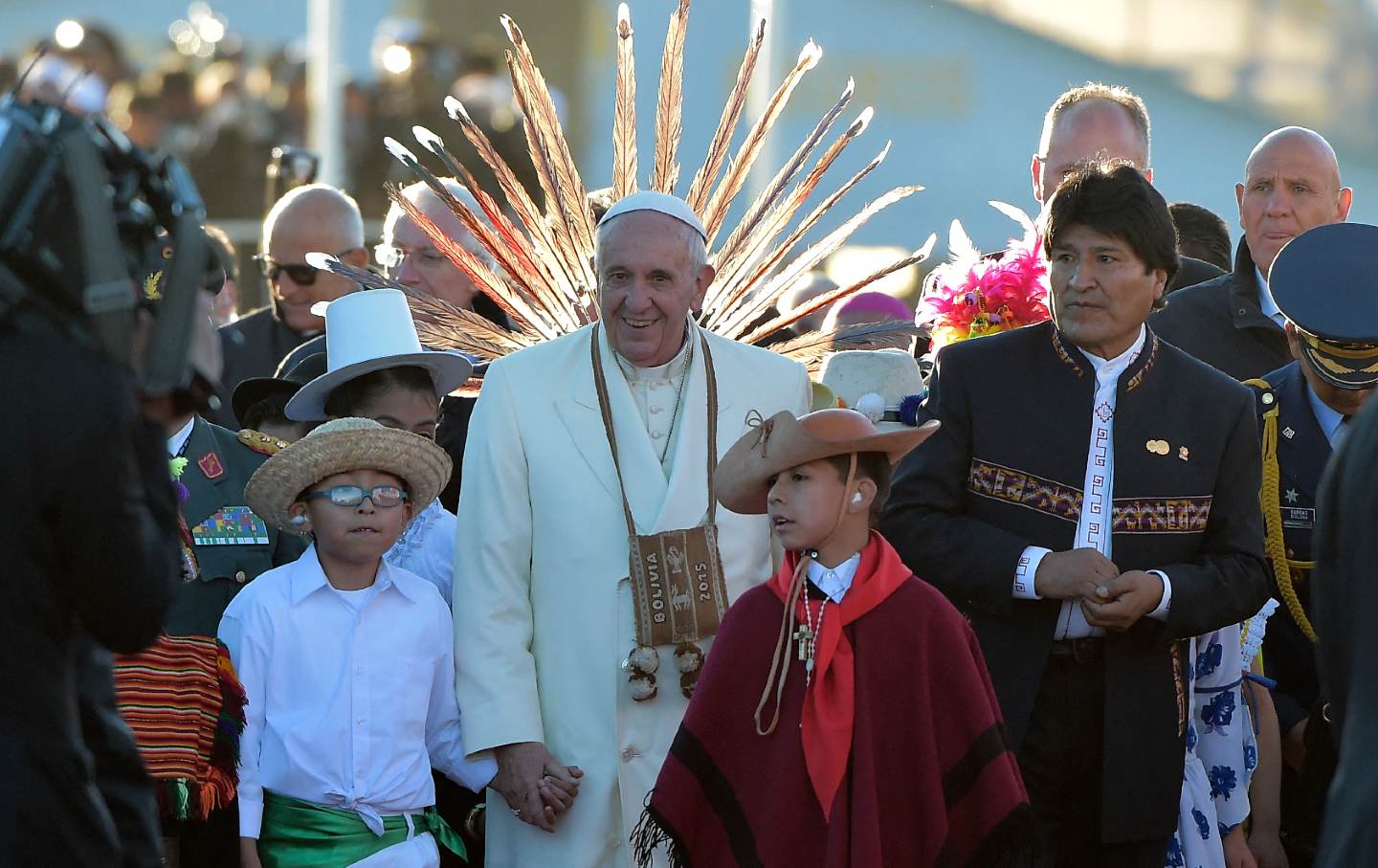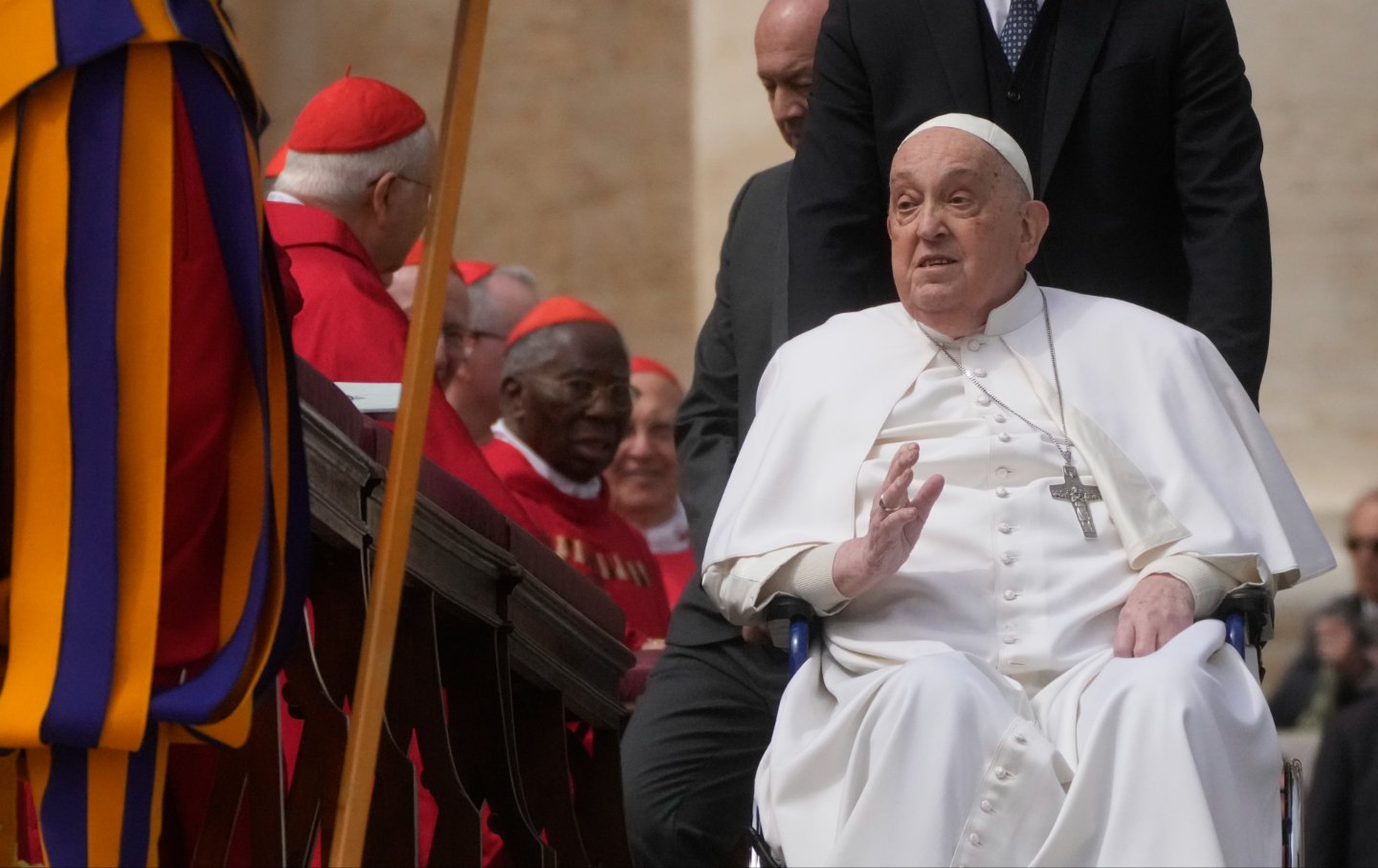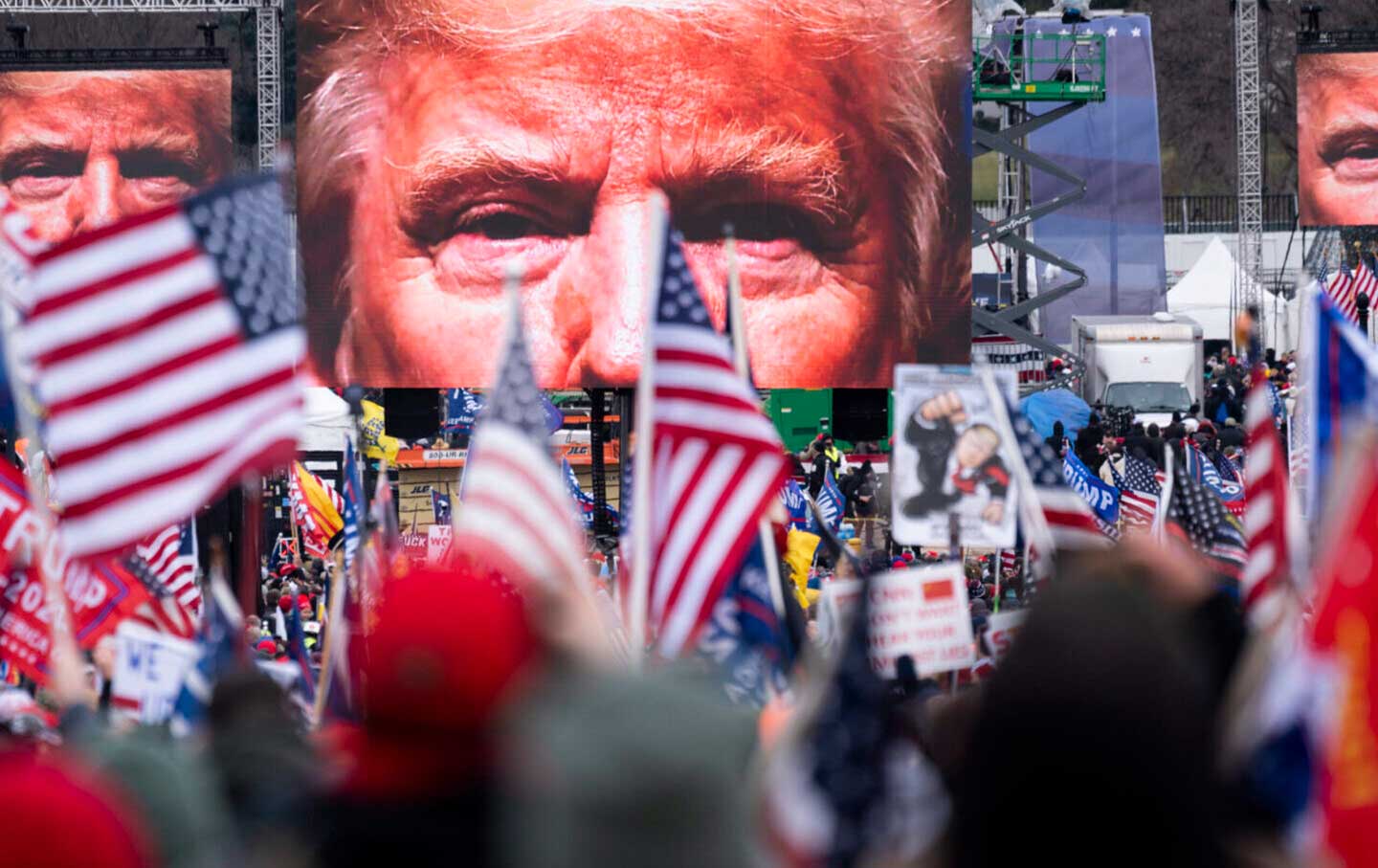A Second Trump Term Will Bring an End to the American Century
Another four years of Trump’s “America first” diplomacy will destroy the country’s already declining global power.

Republican presidential candidate former president Donald Trump stands on stage after being introduced during the New Hampshire Federation of Republican Women’s Lilac Luncheon on June 27, 2023.
(Scott Eisen / Getty Images)This article originally appeared at TomDispatch.com. To stay on top of important articles like these, sign up to receive the latest updates from TomDispatch.com.
With recent polls giving Donald Trump a reasonable chance of defeating President Biden in the November elections, commentators have begun predicting what his second presidency might mean for domestic politics. In a dismally detailed Washington Post analysis, historian Robert Kagan argued that a second Trump term would feature his “deep thirst for vengeance” against what the ex-president has called the “radical Left thugs that live like vermin within the confines of our Country,” thereby launching what Kagan calls “a regime of political persecution” leading to “an irreversible descent into dictatorship.”
So far, however, Trump and the media that follows his every word have been largely silent about what his reelection would mean for US foreign policy. Citing his recent promise of “a four-year plan to phase out all Chinese imports of essential goods,” The New York Times did recently conclude that a renewed trade war with China “would significantly disrupt the U.S. economy,” leading to a loss of 744,000 jobs and $1.6 trillion in gross domestic product. Economic relations with China are, however, but one piece of a far larger puzzle when it comes to future American global power, a subject on which media reporting and commentary have been surprisingly reticent.
So let me take the plunge by starting with a prediction I made in a December 2010 TomDispatch piece that “the demise of the United States as the global superpower could come far more quickly than anyone imagines.” I added then that a “realistic assessment of domestic and global trends suggests that in 2025, just 15 years from now, it could be all over except for the shouting.”
I also offered a scenario hinged on—yes!—next November’s elections. “Riding a political tide of disillusionment and despair,” I wrote then, “a far-right patriot captures the presidency with thundering rhetoric, demanding respect for American authority and threatening military retaliation or economic reprisal. The world pays next to no attention as the American Century ends in silence.”
Back then, of course, 2025 was so far off that any prediction should have been a safe bet. After all, 15 years ago, I was already in my mid-60s, which should have given me a “get-out-of-jail-free” card—that is, a reasonable chance of dying before I could be held accountable. But with 2025 now less than a year away, I’m still here (unlike all too many of my old friends) and still responsible for that prediction.
So, let’s imagine that “a far-right patriot,” one Donald Trump, does indeed “capture the presidency with thundering rhetoric” next November. Let me then don the seven-league boots of the historical imagination and, drawing on Trump’s previous presidential record, offer some thoughts about how his second shot at an America-first foreign policy—one based on “demanding respect for American authority”—might affect this country’s global power, already distinctly on the decline.
As our Lonely Planet Guide to a country called the future, let’s take along a classic study former national security sdviser Zbigniew Brzezinski wrote in retirement in 1997. Drawing on his view that Eurasia remained the “central basis for global primacy,” he argued that Washington had to do just three things to maintain world leadership: First, preserve its position in Western Europe through the NATO alliance; second, maintain its military bases along the Pacific littoral to check China; and finally, prevent any “assertive single entity” like China or Russia from controlling the critical “middle space” of Central Asia and the Middle East. Given his past record and current statements, it seems all too likely that Trump will indeed badly damage, if not destroy, those very pillars of American global power.
Wrecking the NATO Alliance
Trump’s hostility to alliances in general and the North Atlantic Treaty Organization (NATO) in particular is a matter of historical record. His hostility to NATO’s crucial mutual-defense clause (Article 5)—requiring all signatories to respond if one were attacked—could prove fatal. Just days after his 2018 sycophantic summit with Russian leader Vladimir Putin, Fox News host Tucker Carlson asked Trump, “Why should my son go to Montenegro to defend it from attack?”
Weighing his words with uncharacteristic care, Trump replied: “I understand what you’re saying. I’ve asked the same question.” He then offered what could, in a second term, prove a virtual death sentence for NATO. “Montenegro,” he said, “is a tiny country with very strong people.… They’re very aggressive people. They may get aggressive, and congratulations, you’re in World War Three.”
Since then, of course, Putin has invaded Ukraine and the Biden White House has rallied NATO to defend that frontline European state. Although Congress approved a massive $111 billion in aid (including $67 billion in military aid) for Ukraine in the war’s first 18 months, the Republican-led House has recently stalled President Biden’s request for an additional $67 billion critical to Kyiv’s continued resistance. As the campaign for his party’s nomination gathers momentum, Trump’s pro-Putin sentiments have helped persuade Republican legislators to break with our NATO allies on this critical issue.
Keep in mind that, right after Russia invaded in February 2022, Trump labeled Putin’s move “genius,” adding, “I mean, he’s taking over a country for $2 worth of sanctions. I’d say that’s pretty smart.” Last September, after Putin thanked him for claiming that, were he still president, he could end the war in 24 hours, Trump assured Meet the Press: “I would get him into a room. I’d get Zelensky into a room. Then I’d bring them together. And I’d have a deal worked out.”
In reality, a reelected Trump would undoubtedly simply abandon Ukraine, at best forcing it into negotiations that would be tantamount to surrender. As formerly neutral nations Finland and Sweden have rallied to NATO and alliance stalwarts like Britain and Germany make major arms deliveries to Ukraine, Europe has clearly labeled Russia’s invasion and war an existential threat. Under such circumstances, a future Trump tilt toward Putin could swing a wrecking ball through the NATO alliance, which, for the past 75 years, has served as a singular pillar in the architecture of US global power.
Popular
“swipe left below to view more authors”Swipe →Alienating Allies on the Pacific Littoral
Just as NATO has long served as a strategic pillar at the western end of the vast Eurasian land mass, so four bilateral alliances along the Pacific littoral from Japan to the Philippines have proven a geopolitical fulcrum for dominance over the eastern end of Eurasia and the defense of North America. Here, the record of the first Trump administration was, at best, mixed. On the credit side of history’s ledger, he did revive “the Quad,” a loose alliance with Australia, India, and Japan, which has gained greater coherence under President Biden.
But only time spared Trump’s overall Asian diplomacy from utter disaster. His obsessive personal courtship of North Korean dictator Kim Jong-un, marked by two meaningless meetings and the exchange of 27 mash notes, failed to produce any sign of Pyongyang’s (nuclear) disarmament, while weakening America’s alliance with long-standing ally South Korea. Although Japan’s prime minister obsequiously paid court to Trump, he battered that classic bilateral alliance with constant complaints about its cost, even slapping a punitive 25 percent duty on Japanese steel imports.
Ignoring the pleas of close Asian allies, Trump also canceled the Trans-Pacific Partnership, leaving the door open for China to conclude its own Regional Comprehensive Economic Partnership with 15 Asia-Pacific countries that now account for nearly a third of Beijing’s foreign trade. Another four years of Trump’s “America first” diplomacy in the Pacific could do irreparable damage to those key strategic alliances.
Further south, by using Taiwan to both confront and court Chinese President Xi Jinping, while letting the Philippines drift toward Beijing’s orbit and launching a misbegotten trade war with China, Trump’s version of Asian “diplomacy” allowed Beijing to make some real diplomatic, economic, and military gains, while distinctly weakening the American position in the region. Biden, by contrast, has at least partially restored it, a strengthening reflected in a surprisingly amicable San Francisco summit last November with President Xi.
In South Asia, where the bitter rivalry between India and Pakistan dominates all diplomacy, President Trump trashed a 70-year military alliance with Pakistan with a single New Year’s Day message. “The United States has foolishly given Pakistan more than 33 billion dollars in aid over the last 15 years,” Trump tweeted, “and they have given us nothing but lies & deceit, thinking of our leaders as fools.… No more!” Since then, Pakistan has shifted decisively into Beijing’s orbit, while India now plays Moscow and Washington off against each other to its economic advantage.
Just as Trump’s posture toward Europe could swing a wrecking ball through the NATO alliance in a second term, so his mix of economic nationalism and strategic myopia could destabilize the array of alliances along the Pacific littoral, toppling that second of Brzezinski’s three pillars for American global power.
That “Assertive Single Entity” in Central Asia
And when it comes to that third pillar of US global power—preventing any “assertive single entity” from controlling the “middle space” of Eurasia—President Trump failed woefully (as, in fact, had his predecessors). After announcing China’s trillion-dollar Belt & Road Initiative in 2013, President Xi has spent billions building a steel grid of roads, rails, and pipelines that crisscross the middle space of that vast Eurasian landmass, an enormous new infrastructure that has led to a chain of alliances stretching across central Asia.
The power of China’s position was manifested in 2021 when Beijing helped push the US military out of Afghanistan in a deft geopolitical squeeze-play. More recently, Beijing also brokered a breathtaking diplomatic entente between Shi’a Iran and Sunni Saudi Arabia, stunning Washington and many Western diplomats.
Trump’s Middle East policy during his first term in office was focused solely on backing Israel’s right-wing Prime Minister Benjamin Netanyahu—recognizing Jerusalem as Israel’s capital, canceling a nuclear agreement with Iran, seconding his marginalization of the Palestinians, and promoting Arab recognition of Israel. Since the Hamas terrorist attack of October 7 and Netanyahu’s devastating assault on Gaza’s civilian population, President Biden’s reaction was skewed in an almost Trumpian fashion toward Israel, with a consequent loss of influence in the wider region. And count on one thing: An incoming Trump administration would only compound the damage.
In short, Beijing is already toppling the third pillar of American global power in that critical “middle space” of Eurasia. In a second Trump term, an unchecked Chinese diplomatic and economic juggernaut could arguably grind that pillar into rubble.
Africa in the “World Island”
In fact, however, no matter what Brzezinski might have thought, there are other pillars of world power beyond Eurasia—above all, Africa. Indeed, Sir Halford Mackinder, the author of the global geopolitical analysis that deeply influenced the former national security adviser, argued over a century ago that the locus of global power lay in a tri-continental combination of Europe, Asia, and Africa that he dubbed “the world island.”
In the age of high imperialism, Europe found Africa a fertile field for colonial exploitation and, during the Cold War, Washington added to that continent’s suffering by making it a superpower surrogate battleground. But Beijing grasped the human potential of Africa and, in the 1970s, began building lasting economic alliances with its emerging nations. By 2015, its trade with Africa had climbed to $222 billion, three times America’s. Its investments there were then projected to reach a trillion dollars by 2025.
Recognizing the strategic threat, President Barack Obama convened a 2014 summit with 51 African leaders at the White House. Trump, however, dismissed the entire continent, during a 2018 Oval Office meeting, as so many “shithole countries.” The Trump administration tried to repair the damage by sending first lady Melania off on a solo trip to Africa, but her bizarre colonial outfits and ill-timed administration cuts in foreign aid to the continent only added to the damage.
In addition to a storehouse of natural resources, Africa’s chief asset is its growing pool of human talent. Africa’s median age is 19 (compared to 38 for both China and the United States), meaning that, by 2050, that continent will be home to a full one-third of the world’s young. Given his fraught record with the region, Trump’s second term would likely do little more than hand the whole continent to China on a gold-plated platter.
South of the Border
Even in Latin America, the situation has been changing in a complex fashion. As a region informally incorporated into the American imperium for more than a century and suffering all the slights of an asymmetric alliance, its increasingly nationalist leaders welcomed China’s interest in this century. By 2017, in fact, Chinese trade with Latin America had hit a substantial $244 billion, making it—yes!—the region’s largest trading partner. Simultaneously, Beijing’s loans to Caribbean countries had reached a hefty $62 billion by the end of the Trump administration.
Except for drug interdiction and economic sanctions against leftist regimes in Cuba and Venezuela, the Trump White House generally ignored Latin America, doing nothing to slow China’s commercial juggernaut. Although the Biden administration made some diplomatic gestures toward the region, China’s trade rose relentlessly to $450 billion by 2022.
Reflecting a bipartisan indifference in this century, a reelected President Trump would likely do little to check China’s growing commercial hegemony over Latin America. And the region would undoubtedly welcome such indifference, since the alternative—along with draconian moves at the US-Mexican border—might involve plans to fire missiles at or send troops to knock out drug labs in Mexico. The backlash to such unilateral intervention amid panic over immigration could cripple US relations with the region for decades to come.
Fading American Hegemony
In the world that a second Trump term might face in 2025, American global power will probably be far less imposing than it was when he came into office in 2016. The problem won’t be that this time around he’s already appointing advisers determined to let Trump be Trump or, as The New York Times put it recently, who are “forging plans for an even more extreme agenda than his first term.” By every significant metric—economic, diplomatic, and even military—US power has been on a downward slide for at least a decade. In the more unipolar world of 2016, Trump’s impulsive, individualized version of diplomacy was often deeply damaging, but on at least a small number of occasions modestly successful. In the more multipolar world he would have to manage nearly a decade later, his version of a unilateral approach could prove deeply disastrous.
After taking his second oath of office in January of 2025, President Trump’s “thundering rhetoric, demanding respect for American authority and threatening military retaliation or economic reprisal,” might indeed fulfill the prediction I made some 15 years ago: “The world pays next to no attention as the American Century ends in silence.”
Hold the powerful to account by supporting The Nation
The chaos and cruelty of the Trump administration reaches new lows each week.
Trump’s catastrophic “Liberation Day” has wreaked havoc on the world economy and set up yet another constitutional crisis at home. Plainclothes officers continue to abduct university students off the streets. So-called “enemy aliens” are flown abroad to a mega prison against the orders of the courts. And Signalgate promises to be the first of many incompetence scandals that expose the brutal violence at the core of the American empire.
At a time when elite universities, powerful law firms, and influential media outlets are capitulating to Trump’s intimidation, The Nation is more determined than ever before to hold the powerful to account.
In just the last month, we’ve published reporting on how Trump outsources his mass deportation agenda to other countries, exposed the administration’s appeal to obscure laws to carry out its repressive agenda, and amplified the voices of brave student activists targeted by universities.
We also continue to tell the stories of those who fight back against Trump and Musk, whether on the streets in growing protest movements, in town halls across the country, or in critical state elections—like Wisconsin’s recent state Supreme Court race—that provide a model for resisting Trumpism and prove that Musk can’t buy our democracy.
This is the journalism that matters in 2025. But we can’t do this without you. As a reader-supported publication, we rely on the support of generous donors. Please, help make our essential independent journalism possible with a donation today.
In solidarity,
The Editors
The Nation








